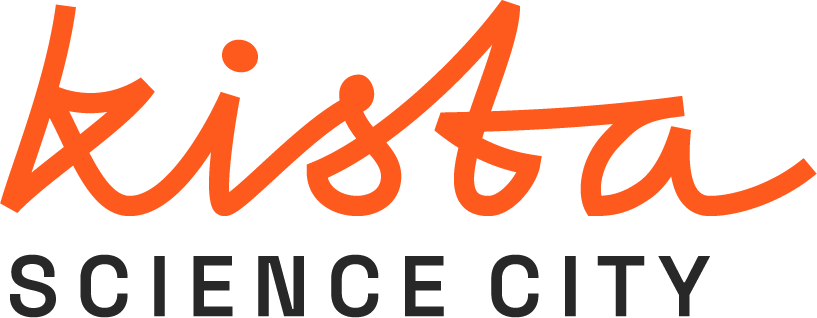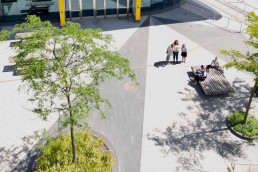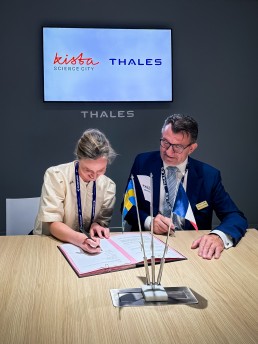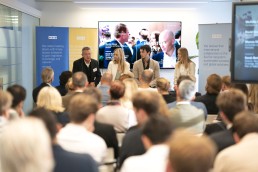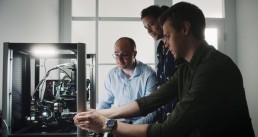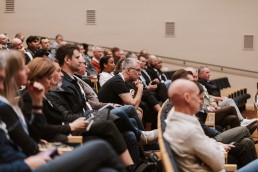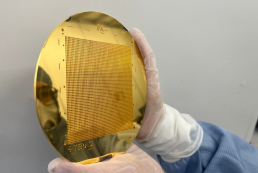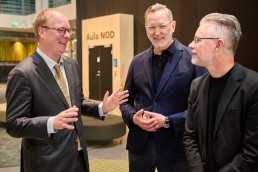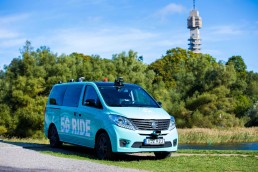From testbeds to infrastructure: Air mobility is taking off
Across Sweden, drone-based air mobility is entering a new phase. What has long been limited to isolated tests is now starting to take physical form, through new infrastructure, city-level pilots, and clearer pathways for integration. And while many challenges remain, the groundwork for regulated, large-scale drone use is beginning to take shape.
Kista Science City is part of that shift, working with partners to make drones a trusted part of everyday urban life.
Testing drones in real-world city settings
This autumn, a so-called drone-in-a-box system will be deployed in Stockholm. The trial in Farsta is part of CITYAM, an EU-funded project where the City of Stockholm, Kista Science City and other partners explore how drones can support public services in urban environments.
The drone-in-a-box — a remote-operable station that stores, charges, and launches a drone on schedule — will be used to collect traffic flow data via an onboard camera. But the test is as much about governance as it is about tech. It puts multiple systems to the test: airspace regulation, privacy, multi-agency coordination, and public acceptance.
Drones can’t simply be flown — they must be planned, approved, and trusted. In dense city settings, that need becomes even more critical due to regulatory complexity, risk mitigation, and the challenge of real-world integration. Projects like CITYAM are helping cities understand how that can be done safely and responsibly.
Sweden’s first droneport
On 10 June, Droneport Skellefteå officially opened — marking a milestone in how Sweden approaches drone integration. The facility is one of the world’s first dedicated drone airfields, with designated areas for takeoff, landing, and recharging. Its aim is to enable safe, repeatable drone operations for use cases like emergency response, medical logistics, and industrial transport.
Karolina Pamp from Kista Science City joined the inauguration panel to discuss how this kind of infrastructure changes the game: “This is a strong signal that Sweden is ready to move from individual tests to shared infrastructure. We’re seeing drones take a real step into public space — and that opens up new possibilities for cities, industry and emergency services alike. It also connects nicely to the drone work we’re doing in Kista, with new tests just around the corner.”
Internationally, only a few countries have taken this kind of step, and Sweden is now among them.
Building the conditions for broader use
Drone technology is well established, but integrating it into everyday urban life is not. That gap is no longer just about regulation or safety — it’s also about communication, coordination, and the ability to show who benefits and how. This is one of the key takeaways from projects like CITYAM, where tests are as much about governance as they are about the tech itself.
”The technology is already here. But until people understand what drones can actually do for them, progress will stay slow,” says Isabelle Nyroth, technical advisor at Kista Science City. ”We need examples that feel real and relatable. Otherwise, this risks becoming just another promising technology that never quite lands. The good news is we’re now starting to see those examples emerge — and when they do, they open people’s eyes to what’s possible.”
What’s next?
Routine drone operations won’t happen overnight. But Sweden is taking visible steps in that direction. As infrastructure emerges and urban pilots expand, the focus is shifting from proving the technology to proving the use cases — whether that’s monitoring traffic flows, transporting medical supplies, or supporting emergency services, to name a few.
That’s the next challenge for drone-based air mobility. Not just to fly, but to fit into the systems, rules, and realities that shape everyday life.
Get involved
Do you want to learn more or explore future collaborations? Reach out to isabelle.nyroth@kista.com
Thales and Kista Science City launch Nordic cybersecurity partnership
Sweden is gaining a new route into the global cybersecurity landscape. Through a partnership with Thales, Kista Science City becomes the Nordic entry point to Trust My Tech — a programme that helps startups test, refine and scale trusted tech in real-world environments.
The collaboration connects Swedish companies with one of the world’s leading defence and digital security firms and opens the door to high-potential markets, expert mentorship, and global infrastructure.
Strengthening Sweden’s cybersecurity ecosystem
Trust My Tech is Thales Digital Factory’s open-innovation programme, designed to help early-stage companies grow by solving real problems in operational settings. Selected startups collaborate closely with Thales teams over a 12-week sprint to test and scale solutions in high-stakes environments. They benefit from 1:1 expert mentorship, advanced platforms, and validation through a global customer network.
With strategic Trust My Tech hubs in Paris, Montreal, and Singapore, Thales is now establishing Kista as its Nordic scouting outpost.
For Swedish startups, scale-ups, SMEs, and software developers, the collaboration offers a rare opportunity to validate solutions faster and access international markets. The partnership enables collaboration on critical areas like cybersecurity, advanced AI, quantum, and dual-use applications — fields where Sweden already holds strong technical capabilities.
As the regional partner, Kista Science City will support Thales in identifying promising companies, building collaborations, and co-creating local business value that can scale beyond Sweden’s borders.
“This collaboration reflects our mutual commitment to advance innovation, security, and sustainable growth within the cybersecurity ecosystem in Sweden and Europe,” says Karin Bengtsson, CEO of Kista Science City. “By partnering with Trust My Tech, we aim to empower emerging technologies and contribute to a safer digital future in times of growing uncertainty.”
For Thales, the move is part of a broader innovation strategy that relies on strong regional ecosystems and credible local partners.
“Through this collaboration in Sweden, Thales will contribute its world-class cybersecurity capabilities to bolster the Cybersecurity Hub hosted by Kista Science City,” says Håkan Ahlström, Country Director, Sweden and Finland at Thales. “The partnership enhances the hub’s international reputation and supports a dynamic, innovation-driven environment for Swedish startups.”
Join the next programme
Swedish companies can now apply to join the next Trust My Tech programme running from September to mid-December 2025.
Participating companies will gain hands-on support from Thales’ experts, real-world validation opportunities, and exposure to Thales’ global customer base. Additionally, they can choose to work from optional workspace in the Kista Science Tower, offering opportunities to collaborate with other innovators in Kista’s tech ecosystem.
Applications close on 29 August and will be reviewed promptly. Selected startups will be invited to a virtual pre-pitch on 5 September, ahead of final selection.
—
For more information, reach out to sakarias.strand@kista.com
Opening doors for Swedish tech: Lessons from Access UK
What does it take to turn international ambition into actual market traction? For ten Swedish tech companies, Access UK offered a sharp, three-day answer.
Organised by Kista Science City in collaboration with the Swedish Chamber of Commerce and the British Embassy in Stockholm, the programme brought a selected group of deep tech, climate tech, and connectivity scaleups to London during London Tech Week. The goal: to accelerate UK market entry through high-level meetings, direct insights, and on-the-ground experience.
The result was a tightly focused week of tailored customer meetings, speed networking, panel sessions, and expert briefings — all based in London, but with insights and connections reaching across the UK’s broader innovation landscape.
“The programme delivered what many don’t: real access, honest conversations, and a clear view of both the opportunities and the hurdles ahead,” said James Campion, CEO of TeraSi.
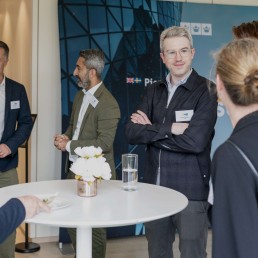
Image Credit: Swedish Chamber of Commerce for the UK
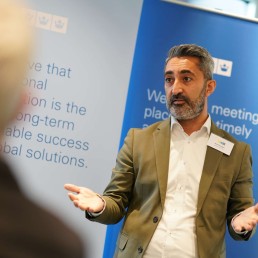
Image Credit: Swedish Chamber of Commerce for the UK
From insight to traction
By the end of the week, several companies had already secured follow-up meetings or opened discussions about potential partnerships. For others, the biggest shift was strategic: clearer positioning, sharper communication, and a stronger understanding of how to move forward.
“There’s a shift you start to notice,” said Arash Sangari, programme manager at Kista Science City. “Participants are still energised, but already thinking ahead — how to bring the learnings home, how to make the UK a real priority. That kind of momentum, from insight to action, is exactly what we’re aiming for.”
Much of that momentum came from the people in the room: investors, journalists, ecosystem leaders, and fellow entrepreneurs. The Access UK programme combined intimate roundtables with media and PR experts (including Sifted), with structured investor matchmaking and exposure at major industry gatherings like the Chamber’s Tech Forum.
And while London was the hub, the UK opportunity is broader. “Cambridge, Manchester, Bristol – the regional ecosystems are alive with talent, capital, and unmet demand,” Campion reflected. “The UK is open for business, and the hangups of Brexit feel like a thing of the past.”
Learning the landscape — and standing out in it
For many participants, the week also brought clarity around what makes the UK market different. Sales cycles, proof points, and partner expectations vary — and local context often matters more than companies anticipate.
“The hardest part isn’t just getting meetings — it’s understanding how business actually works here,” said Sangari. “What kind of traction do you need to convince a buyer? How are relationships built? What are the red flags you didn’t know you were giving off?”
According to Alfred Lindberg of Univrses, part of the value came from going together with other Swedish tech companies. “It gives you weight. Even as a small company, you’re not showing up alone — and that opens doors. Plus, you share more than you think with the other companies. Different fields, same challenges.”
That trust also extends to the Swedish brand. From sustainability to engineering quality, Swedish companies often arrive with a reputation that works in their favour — a legacy built by decades of successful Nordic expansion into the UK. But translating that into deals takes structure, preparation, and credible support.
“It’s easy to underestimate how competitive these markets are,” said Lindberg. “Initiatives like this are a smart way to help Swedish companies hold their ground — especially in strategic fields like AI and infrastructure, where we want to stay globally relevant.”
What’s next?
For Kista Science City and its partners, the work doesn’t stop when the flights land. The team will continue to support this year’s participants as they take next steps — from navigating ongoing UK conversations to preparing for entry into other international markets.
“Part of our role is to make sure companies are prepared before they go,” said Sangari. “But just as important is what happens after — helping companies stay focused, keep up the momentum, and make use of the networks they’ve built.”
Looking ahead, Access UK is one piece of a broader effort to give Swedish tech companies the right conditions to grow internationally — faster, and more strategically. That includes continued collaboration with the British and Swedish embassies, the Chamber, and ecosystem partners like London & Partners.
Global competition isn’t slowing down, and neither should Swedish scaleups.
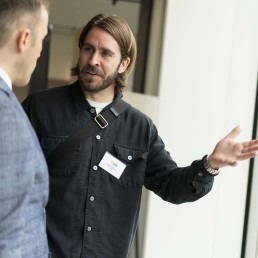
Image Credit: Swedish Chamber of Commerce for the UK
Get involved
Access UK is a market acceleration programme run by Kista Science City in collaboration with the Swedish Chamber of Commerce for the UK and the British Embassy in Stockholm.
This autumn, Access Germany will bring ten Swedish growth companies to Munchen, with new programmes launching in the US and Canada in 2026.
To learn more about upcoming programmes or connect withparticipating companies, reach out to Arash Sangari at arash.sangari@kista.com.
Kista companies invest early in future tech talent
Sweden’s new STEM strategy has set ambitious goals for education and industry collaboration. In Kista, companies are moving from policy to practice — meeting students sooner, building relationships, and redefining what it means to secure tomorrow’s tech talent.
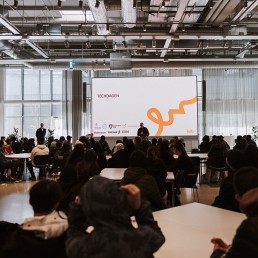
In February 2025, the Swedish government launched a new STEM strategy to strengthen education and encourage closer collaboration between schools and industry — from preschool through to PhD. The goal is to raise performance, broaden participation, and help more young people find a path into science, technology, engineering, and maths.
This national focus is echoed in Kista, where more companies are choosing to act early instead of waiting until students are ready to enter the workforce. They’re hosting workshops, running hands-on activities, and listening to young people’s perspectives. This isn’t about charity; it’s a business-critical move.
IBM and eCiceron are two companies putting this new approach into action. We asked them what’s driving this shift — and what they’ve learned so far.
From policy to practice
At IBM, that work includes national initiatives like the Cybersecurity Academy — developed together with MSB and Unga Forskare to build digital safety skills and spark interest in tech. In 2024 alone, the programme reached over 260,000 children and young people through workshops, events, and training. The aim is to reach even more this year.
eCiceron, a Kista-based tech firm specialising in digital security, has stepped up its involvement with local talent. The company recently participated in Tech Talent Connect — part of Systemvetardagen — where more than 500 university students in cybersecurity, AI, and computer science were matched with prospective employers. Events like these help eCiceron both raise its profile among young people and hear firsthand what tomorrow’s tech professionals care about.
The value of acting early
For both IBM and eCiceron, early engagement with young people isn’t just about visibility — it’s a way to stay relevant and adaptable in a rapidly changing tech landscape.
“We want to ensure a diverse and future-ready workforce,” says Evelina Pärnerud, CSR Manager at IBM. “By reaching young people early, we can spark an interest in technology—not just for those who will work directly in the industry, but for everyone. Tech literacy is becoming essential for all sectors of society.”
Marc Rantanen, CEO of eCiceron, puts it this way: “The biggest benefit is not just access to new skills, but the cultural and strategic agility this new generation contributes. By integrating young talent early, we future-proof our company and keep ourselves on the edge of innovation and culture.”
For both companies, the focus is shifting away from simply filling roles. The goal is to build a talent pool that’s adaptable, curious, and aligned with how technology — and society — are evolving.
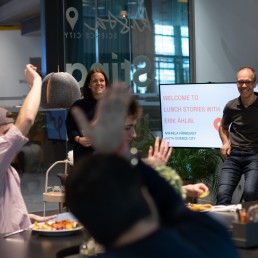
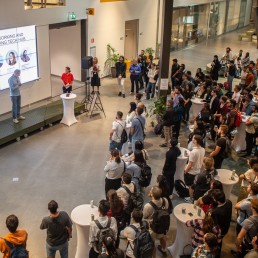
Two-way learning
Opening up to students has become a way for companies to challenge their own thinking and adapt to new perspectives. Both IBM and eCiceron say that working with students has sparked fresh ideas inside their own teams.
“Young people are incredibly smart, and they often push us to think in new ways,” says Evelina Pärnerud. At IBM, student interactions have sparked internal conversations around how problems are framed, what assumptions are held, and how openness to new perspectives can unlock innovation.
eCiceron has seen similar effects. “We’ve had cases where a student, with the right mindset, has accelerated into the business faster than a more senior professional,” Rantanen explains. “That challenged our assumptions about the typical learning curve. Potential and attitude can outweigh experience — especially in tech.”
These experiences aren’t one-offs. For companies, working with students is becoming part of a bigger shift. One where recruitment and development are less about static processes, and more about building ongoing relationships and learning together.
The risk of waiting
Some companies already treat student engagement as a core strategy. Others are still deciding when — or if — to get started. But as competition for talent intensifies, the argument for early action keeps getting stronger.
That risk isn’t just about missing the best candidates. “It’s about staying relevant, competitive, and prepared for the challenges ahead,” says Evelina Pärnerud. Students form impressions early, and by the time they enter the job market, many already know which companies they associate with purpose, opportunity, or innovation. Getting on their radar early should be a top priority.
Rantanen at eCiceron warns that companies who wait too long to build relationships with students risk losing relevance — both technically and culturally: “Without strong pipelines from academia and youth communities, companies may face a talent cliff where the next generation simply doesn’t consider them relevant or attractive.
Moreover, without the diversity of thought that young professionals bring, companies may fall into stagnant thinking and miss out on disruptive ideas. In our industry, that can mean falling behind in security innovation, failing to adopt new standards, or not seeing emerging customer needs early enough.”
The next generation will decide which companies feel relevant, innovative, and worth joining. Those building relationships today will likely be the ones to attract talent tomorrow.
National priorities, local action
Sweden’s new STEM strategy sets the direction: stronger tech education, earlier engagement, and closer collaboration between schools and industry. But policies only matter when they’re put into practice, and that happens locally.
In Kista, these ambitions are already becoming reality. Companies are joining school-led initiatives, opening their doors to students, and finding new ways to support the education ecosystem. Some are building long-term partnerships, while others start small — with a single event, workshop, or class visit.
The common denominator is a shift in mindset. In practice, this means the gap between education and industry is narrowing — one conversation at a time.
“We’re seeing more companies in Kista get involved in talent initiatives — especially in areas like cybersecurity, semiconductors, and AI,” says Mikaela Färnqvist, Talent and Community Manager at Kista Science City. “Our role is to coordinate these efforts and make it easier for companies to get involved—whether it’s through major initiatives or smaller actions. By staying committed and actually working together, we can achieve results that matter and last.”
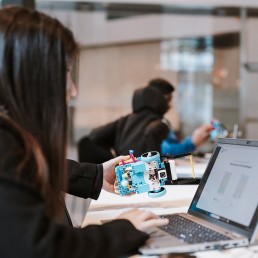
For those who haven’t begun yet, the path forward is clear. Reach out to mikaela.farnqvist@kista.com to get involved!
From code to clinic: New lab tech from Qamcom and Mabtech
What happens when two companies from entirely different domains team up, and stay teamed up? In the case of Mabtech and Qamcom, nearly a decade of collaboration has led to EYRA: a new research platform designed to streamline high-precision lab work in immunology.
Mabtech, a biotech firm specialising in immunoassays and instruments for research, brought the scientific insight. Qamcom, an engineering company based in Kista, contributed deep technical expertise. Together, they’ve built a system that makes it faster and easier to detect dozens of immune-related analytes — and is poised to being used across various research fields such as vaccines, inflammation, and infectious diseases.
Making lab work easier
EYRA, a purpose-built confocal microscope, supports a method called multiplex immunoassays, which allows researchers to analyse many immune markers in a single run. The platform delivers high-sensitivity with minimal manual work — no calibration, fluid handling, or clean-up required — and is designed to support long-term studies without compromising consistency.
“What really makes an advanced instrument like EYRA different is the simplicity,” says Christian Smedman, CTO at Mabtech. “It’s so user-friendly that even someone with no lab experience could use it — and that’s not something you could say about competing systems.”
Its intuitive setup also supports automation, a key factor for labs scaling up to clinical trials and larger research programmes.
Combined expertise, shared goals
The development of EYRA wasn’t a one-off assignment. It was the outcome of a long-term R&D collaboration that started in 2016 and kept evolving through two full-scale product development phases, feature upgrades, and continued joint refinement.
Mabtech guided the scientific direction and core functionality. Qamcom provided the complete design and development of the laser-based instrument.
“We don’t have the technical know-how to put together a sophisticated instrument like EYRA,” says Smedman. “But we helped shape it by working together with Qamcom’s engineers toward better performance and a more intuitive user experience. From the very beginning, we’ve talked about our cooperation with Qamcom, since it gives us credibility in an area where we don’t have expertise.”
Ann Louise Johansson, General Manager at Qamcom, notes that the working structure played a big role in building alignment and trust over time.
“From day one, we’ve met face-to-face every four weeks to set directions, handle issues, and decide on next steps,” she says. “Even when we weren’t in active development phases, we kept that rhythm. That consistency helped us stay aligned and ensure focus on the right things.”
As Johansson sees it, strong expertise and trust — across disciplines and over time — are what made the project succeed.
“It’s at the intersection of disciplines where the most powerful breakthroughs happen. No single team could have done this alone. But together, we’ve built something that can make an impact and genuinely improve outcomes in bioscience and public health.”
Innovation and security in the grey zone
The boundaries of conflict are shifting. Today, national security isn’t just tested on battlefields, but in boardrooms, research labs, and everyday digital infrastructure. This is the grey zone: a space between peace and war, where hostile actors use influence, manipulation, and stealth to undermine companies and institutions.
For an open, innovation-driven country like Sweden, that creates a growing dilemma. The same systems that support talent exchange, global research, and technological development are also becoming points of vulnerability — quietly targeted, tested, and exploited.
At Safeguarding innovation in uncertain times, we brought together the Swedish Security Service (SÄPO) and experts from national security, cybersecurity, and industry to examine what this new landscape means for Sweden’s innovation ecosystem. This article explores the central themes of the day, covering the threats undermining innovation, and how companies, policymakers, and researchers can respond to meet them.
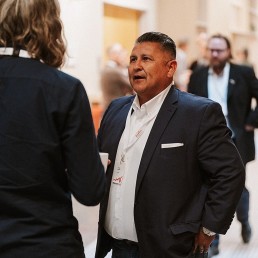
Mr. Cooper Wimmer
What we must protect
According to the Swedish Security Service (SÄPO), the threats facing Sweden today are increasingly complex: diffuse, fast-moving, and often hidden in plain sight. They range from cybercriminals-for-hire to hostile foreign investments, from data leaks to manipulation campaigns designed to destabilize and undermine trust.
In this landscape, even simple tactics can cause outsised harm. And the traditional idea of national no longer applies. What’s at stake is broader: economic independence, civil freedoms, and Sweden’s ability to innovate without compromise. The core challenge is speed — our protections aren’t evolving as fast as the threats we face.
The answer, according to SÄPO, isn’t to cut ties or close borders. It’s to raise awareness, clarify internal priorities, and approach international partnerships with eyes open. “De-risk, don’t decouple” was the message. That means asking three simple questions across every organisation: What needs protecting? From whom? And how?
From openness to strategic awareness
Sweden’s openness has long supported growth and collaboration, but that same openness is now being exploited at scale. Foreign powers aren’t just targeting systems — they’re systematically tracking individuals: students, researchers, and employees abroad who can provide access to sensitive knowledge and IP.
This warning came from Cooper Wimmer, Executive Vice President at Strider, who highlighted how IP theft has already had serious consequences. In the U.S., such breaches cost the economy between $350–500 billion in 2024 alone. One company raised $500 million, scaled quickly, and then collapsed after its innovation was stolen. Sweden risks facing similar outcomes unless awareness catches up to the threat.
“The defense isn’t retreat or isolation,” said Wimmer. “Sweden must move from openness-as-default to strategic awareness. That means using data, AI, and open-source intelligence to detect patterns, level the playing field, and protect innovation without cutting ties. Technology can help, but it’s mindset that makes the difference.”
In a world of manufactured chaos, trust is the first casualty
Some of today’s most powerful attacks don’t target systems — they target trust. Disinformation, conflicting signals, and manipulated narratives are now common tools used to confuse, destabilise, and devide societies.
Dr Gazmend Huskaj, Head of Global Cyber and Security Policy at the Geneva Centre for Security Policy, pointed to the COVID-19 pandemic as a key example. During those turbulent years, shifting policies and misinformation made it difficult for both public and private actors to navigate the crisis. And the result wasn’t only confusion. Many people disengaged entirely, creating a vacuum that opportunistic actors could exploit.
In an environment shaped by confusion and distrust, short-term fixes only add to the noise. What’s needed is long-term strategic clarity, stronger internal coordination, and a commitment to information hygiene. Because in a world where chaos is manufactured, resilience depends on the quality — not just the quantity — of the information we rely on.
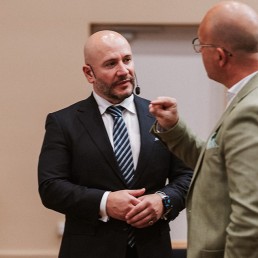
Dr. Gazmend Huskaj
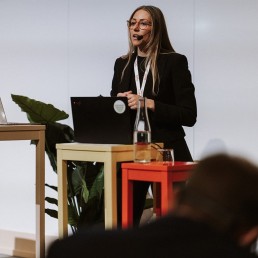
Ms. Joanna Partyka
Business as critical infrastructure
In today’s threat landscape, companies aren’t just protecting their assets — they’re helping protect Sweden. Businesses have become central to national security, and that makes them targets. These attacks rarely involve dramatic takedowns. Instead, they focus on people. Insider threats, disinformation, and subtle trust manipulation are now common tactics—used to undermine leadership, damage reputations, or destabilise supply chains.
This human-centred risk was a key focus for Joanna Partyka, Senior Security Advisor at Redpill Linpro. Too many organisations, she argued, still treat security as a checkbox—something to be ticked off rather than built in. She called for a mindset shift: one that embeds security into daily operations — from onboarding and reporting systems to supplier screening and insider threat detection.
Culture plays a crucial role in supporting this shift. Firewalls can’t stop a manipulated employee from causing harm. If resilience is to mean anything, it has to live inside the business.
Rethinking the cybersecurity industry
Not all vulnerabilities come from external threats. Some of the most persistent failures in cybersecurity are self-inflicted, and they continue despite decades of investment. Major breaches are still common. Even basic practices — like not reusing passwords — remain widely ignored, including within the industry itself.
During a live demonstration at the event, ethical hacker and entrepreneur David Jacoby turned the spotlight on the industry itself. He argued that it often prioritises frameworks and technical fixes over real-world usability and human behaviour. Too many solutions are bolted on after the fact, misunderstood by users, or poorly aligned with the way people actually work.
Instead of chasing the next innovation, organisations should focus on getting the basics right. That means smarter implementation, stronger leadership engagement, and building security in from the very start — not patching it on after the fact.
From insight to action: Building resilience together
In one of the day’s final sessions, Kim Elman (Northwave Cyber Security), Angelica Holmgren (EY), and Dr Gazmend Huskaj explored how organisations can translate growing awareness into concrete action. The panelists outlined several practical actions that any organisation — large or small — can take to build long-term resilience:
- Design security into products from the start, rather than adding it later as a compliance step.
- Protect your most valuable assets—the “crown jewels”—with focused, effective security measures.
- Build a security-aware culture across teams, using incentives, training, and leadership support.
- Start small with threat intelligence sharing, in trusted networks, and scale as maturity grows.
For smaller organisations, the message was especially direct: assign responsibility, protect what matters most, and scale your security practices as the business grows. Because in the grey zone, no organisation is too small — or too irrelevant — to be a target.
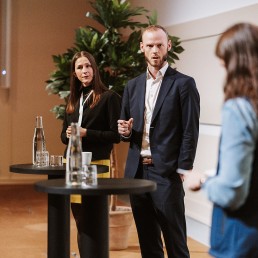
Ms. Angelica Holmgren and Mr. Kim Elman
Get involved
Safeguarding innovation is a shared responsibility. If you’re working at the intersection of tech, security, or national resilience and want to explore future initiatives with Kista Science City, reach out to Sakarias Strand at sakarias.strand@kista.com.
Semiconductor Arena
Image credit: TeraSi
Semiconductor Arena: A new platform for Sweden’s growing chip sector
The challenge
The global demand for semiconductors is rising fast. Across Europe, countries are investing to secure supply, build capacity, and reduce reliance on external producers. The goal: to strengthen Europe’s resilience in a technology that powers nearly all modern systems.
In Sweden, the need to boost domestic production and innovation efforts has become increasingly clear since the COVID-19 pandemic. When global supply chains were disrupted, Swedish companies felt the impact immediately. That period exposed structural gaps — from limited infrastructure and restricted access to production facilities, to weak links between industry, academia, and research. Looking ahead, the sector also faces a generational shift, making it critical to attract new talent and pass on expertise.
In Kista, targeted efforts are now being made to close these gaps and build a stronger, more connected semiconductor ecosystem.
Semiconductor Arena
Led by Kista Science City, KTH, RISE and STING, Semiconductor Arena is a new platform for advancing Sweden’s chip capabilities. By offering shared resources and meeting places for startups, researchers, and established companies alike, the Arena supports new innovation constellations and helps accelerate the path from research to commercialization.
A key ambition is to make Electrum Laboratory a more open and social hub for the industry. It will serve as a space for showcasing innovation, networking, and deep technical collaboration — a neutral platform for students, innovators, and leading players to meet, learn, and build together.
The Arena also supports broader outreach. That includes raising awareness of semiconductors and their societal relevance — and attracting new talent through matchmaking events, student fairs, and shared learning opportunities.
Planned activities for fall 2025 include:
- Thesis fair
- Startup coaching by Sting
- Onboarding early-stage companies to the Electrum lab environment
“Semiconductor Arena is about creating value today while laying the foundation for long-term competitiveness,” says Karin Bengtsson, CEO of Kista Science City. “The first step is to reach out to the semiconductor community to shape the platform together – by the industry, for the industry.”
A national centre
Kista’s position as a national semiconductor hub is central to this initiative. The area already hosts Sweden’s competence center for semiconductors and one of the EU’s pilot lines, operated by KTH through the EU Chips JU programme. Together, these assets create a unique environment of advanced infrastructure, world-class research, and deep industry expertise.
Building on these strengths, KTH is now expanding its activities at Electrum, including the launch of a new pilot line for power semiconductors. The goal is to accelerate production, support talent development, and strengthen Sweden’s role in building strategic capacity in the EU.
Do you want to get involved? Reach out to karin.bengtsson@kista.com
ESA Phi-Lab Sweden opens new pathways for AI innovation in space
Sweden is taking a bigger leap into space innovation. Through ESA Phi-Lab Sweden — a new national initiative led by RISE — the country is joining the European Space Agency’s (ESA) innovation network with a sharp focus on AI and edge learning in space systems. Backed by Vinnova and ESA, the lab will accelerate the commercial use of AI technologies across a range of space-related applications — from Earth observation and data analysis to AI-enabled autonomy in space systems.
The programme is coordinated by Kista-based Tobias Edman, Director of ESA Phi-Lab Sweden and Unit Manager for Data Platforms and Systems at RISE.

Tobias Edman, Director of ESA Phi-Lab Sweden
From research to real-world innovation
ESA Phi-Lab Sweden is part of a growing European network that brings advanced technologies from research labs to market-ready solutions. With a total budget of €5.2 million, the programme will run for six years. During the first four years, RISE will launch open calls and award seed funding for early-stage projects in collaboration with Vinnova.
“The lab will put Sweden in a European focus for the analysis of space data on space platforms,” says Tobias Edman. “There is huge potential in more efficient analyses for Earth observation, but also for autonomous systems and exploration of the space environment.”
The initiative is run in partnership with KTH, the Swedish Institute of Space Physics (IRF), and the Swedish Space Corporation (SSC). It also ties into Sweden’s wider space data ecosystem — including the Swedish Space Data Lab, a national innovation environment that gives companies access to the Digital Earth Sweden platform and development tools.
Space as a testbed
The programme invites collaboration with companies — from startups to established developers — working with AI, data analysis or edge computing to develop and test solutions for space environments.
“We want to collaborate with both hardware and software developers,” says Edman. “There’s great potential in working with traditional space companies, as well as with software firms developing AI models for data analysis on space platforms. For startups aiming to demonstrate their capabilities in a space environment, ESA Phi-Lab Sweden is a powerful enabler. They’ll be able to access funding, testing facilities, and expert assistance to support development.”
These efforts are also supported by RISE’s national network of testbeds and demo environments, where companies can test and adapt their technologies under real-world conditions.

New opportunities for tech companies
The space sector is increasingly shaped by data, AI, and automation — areas where Sweden, and technology clusters like Kista, have strong capabilities. ESA Phi-Lab Sweden creates a new path for companies to explore space-related development without needing to come from the traditional aerospace industry.
For the many cutting-edge companies in Kista, the programme presents an opportunity to connect with national efforts and explore how their expertise in AI and edge computing could find applications beyond Earth.
Learn more and explore how to get involved
Empowering the next generation of tech
Some of the key partners of the STEM-Initiative at the kick-of on April 14 2025. Anders Österberg – Acting Mayor of Stockholm, Anders Österlund – Head of employer branding and people experience, Ericsson Sweden and Magnus Breitholtz – Senior advisor to the president of Stckholm University and Chairman of Vetenskapens Hus.
Swedish version below / Svensk version finns nedan
Kista Science City is working together with KTH, Stockholm University, the City of Stockholm, and the local Kista ecosystem in addressing the growing shortage in STEM related competencies. Our goal is to collaborate across, and strengthen, the entire chain—from primary and secondary education to higher education. If we don’t act now, Sweden’s role as a leading nation in innovation and engineering is at risk.
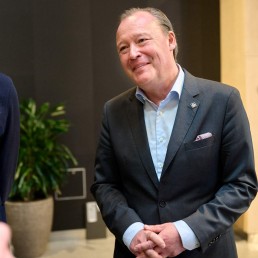
One of the key partners of the STEM-Initiative at the kick-of on April 14 2025. Mikael Lindström – Deputy President of KTH.
This initiative is a long-term investment in tomorrow’s talent, helping them understand and make the most of their opportunities. We do so by highlighting inspiring stories and examples from both academia and industry. Järva, with its large proportion of young people and its proximity to Kista, is the perfect location for our preliminary study. Here, we will gather examples of good practices and develop methods to boost the implementation of Sweden’s national STEM strategy.
“We want to create an inclusive environment where everyone can help shape the future of technology. This isn’t just about encouraging STEM studies—it’s about offering pathways to a meaningful career in tech. Through purposeful collaboration focused on our youth, we are creating better opportunities for the entire sector,” says Karin Bengtsson, CEO of Kista Science City.
Access to talent is a crucial issue for Swedish growth and European resilience in an increasingly turbulent world. We have several tech-intensive sectors that are growing while also undergoing a generational shift, where existing expertise must be replaced with new talent. Here lies the challenge of attracting fresh talent and facilitating knowledge transfer as early as possible.
We invite both established players and new visionaries to join us in shaping the future of technology. Together, we can create a robust, innovative sector where tomorrow’s challenges are met with the right skills and passion.
Our first activity is the Tech Day where 120 students from grades 7–8 meet inspiring industry leaders and tech entrepreneurs in Kista on May 15. Your company could easily become a part of this movement by e.g. participating in a workshop, joining the students for lunch or hosting an Inspiring company visit.
To know more about how this might work, please contact Project Mananger nellie.strand (at) kista.com
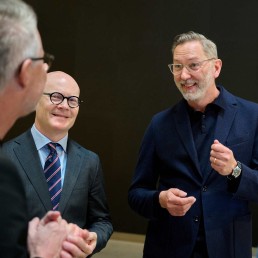
Some of the key partners of the STEM-Initiative at the kick-of on April 14 2025. Fredrik Boström – Superintendent Järva, City of Stockholm and Anders Österlund – Head of employer branding and people experience, Ericsson Sweden.
Kraftsamling för nästa tech-generation
Kista Science City arbetar tillsammans med KTH, Stockholms Universitet, staden och det lokala ekosystemet i Kista för att möta den växande kompetensbristen inom teknik. Syftet är att samverka inom och stärka hela kedjan från grund- och gymnasieskolan till universitet och högskola. Om vi inte agerar nu står Sveriges roll som framstående innovations- och ingenjörsnation på spel.
Initiativet är en långsiktig satsning där vi gemensamt investerar i framtidens talanger och hjälper dem att både förstå och ta vara på sina möjligheter. Genom att lyfta fram inspirerande exempel från både akademin och näringslivet visar vi att passion och engagemang finns här – oavsett var en bor. Järva, med sin stora andel unga och närhet till Kista, utgör en idealisk plats för vår förstudie. Här samlar vi exempel på effektiva insatser och utvecklar metoder som stärker implementeringen av Sveriges nationella STEM-strategi.
”Vi vill skapa en inkluderande miljö där alla kan vara med och forma framtidens tekniska landskap. Detta handlar inte bara om att uppmuntra STEM-studier, utan också om att erbjuda vägar till en meningsfull karriär inom tech. Genom ett målmedvetet samarbete kring våra unga skapar vi bättre möjligheter för hela sektorn,” säger Karin Bengtsson, VD på Kista Science City.
God tillgång till kompetens är en ödesfråga för svensk tillväxt och europeisk motståndskraft i en alltmer turbulent samtid. Vi har flera teknikintensiva sektorer som växer och samtidigt genomgår generationsskiften där befintlig kompetens behöver ersättas. Här finns det både en utmaning i att attrahera ny talang och i att möjliggöra kunskapsöverföringen på bästa sätt tidigt.
Vi bjuder in både etablerade aktörer och nya visionärer att vara med och forma framtiden för teknik. Tillsammans kan vi skapa en robust, innovativ sektor där framtidens utmaningar möts med rätt kompetens och engagemang.
Som ett första steg i denna satsning ordnar vi Techdagen den 15 maj. Då välkomnar vi 120 elever från årskurs sju och åtta till Kista, för att möta näringslivet och bli inspirerade. Genom att exempelvis delta i en workshop, luncha med eleverna eller stå som värd för en inspirationsträff kan ditt företag kan enkelt bli en del av detta.
Vill du veta mer om hur det skulle kunna gå till, skriv till projektledare nellie.strand (at) kista.com
Driving the future: Insights from Future 5G Ride
How can autonomous vehicles be safely integrated into public transport systems? And what does it take to manage them without a driver behind the wheel?
Over the past 3.5 years, the Future 5G Ride project has explored these questions—serving as a testbed for connected, driverless mobility. It combined 5G, AI, and smart infrastructure to investigate how autonomous vehicles can operate safely as part of a broader transport ecosystem. This included coordination between vehicles, infrastructure, and the digital systems used for supervision and traffic management.
Led by Kista Science City and involving a broad mix of partners from industry, academia, and public transport, Future 5G Ride focused on practical integration. Vehicles, sensors, and operations were connected and tested together to explore how autonomy could work at scale.

What we learned
Autonomy begins with the system
A key lesson from Future 5G Ride is that autonomous public transport can’t rely on vehicle intelligence alone. To be safe, scalable, and effective, it needs to be part of a larger system—connected not just to other vehicles, but to roadside infrastructure and human operators.
The testbed explored what that system looks like in practice: vehicles, infrastructure sensors, and control centers working as one. This fleet-based model makes it possible to coordinate operations centrally, respond in real time, and scale autonomy for everyday use in public transport.
Safety comes from shared awareness
Future 5G Ride showed how combining infrastructure sensors with AI-supported monitoring can address two distinct safety challenges in driverless public transport: situational awareness around the vehicle, and passenger safety inside it.
Roadside sensors helped detect pedestrians and traffic changes, extending the vehicle’s awareness beyond what onboard systems could see. This improved its ability to respond to external conditions in real time. Inside the vehicle, AI-assisted monitoring focused on passenger well-being—detecting incidents or unusual behavior that could require remote intervention.
Together, these capabilities showed how operations can be safely supervised from a distance, reducing the need for onboard staff while improving working conditions overall.
“To be safe, efficient and comfortable in intensive urban traffic, autonomous vehicles need to be aware of all surrounding road users,” says Dr. Yuri Tarakanov, Research Manager at Viscando. “Future 5G Ride gave us the chance to demonstrate how infrastructure sensors can extend the situational awareness of autonomous buses—especially in dense urban settings where vulnerable road users and cars can be hidden from the autonomous vehicle by for example building walls or vegetation.”
Reliable connectivity is the key to future deployment
The testbed made clear that real-time autonomy only works when networks are ready for it. Remote supervision, live data-sharing, and system-wide coordination all depend on robust, low-latency communication, especially in complex urban settings. By testing both public and private 5G networks, the project highlighted what reliable connectivity actually looks like in practice—and why continued network development is critical to scaling autonomous transport beyond isolated pilots.
Collaboration that drives innovation
Future 5G Ride brought together partners from across sectors—each contributing the capabilities needed to develop, test, and validate autonomous transport in operational settings:
- Tech leaders (Ericsson, Telia, Intel) provided advanced 5G and AI capabilities.
- Innovative scale-ups (Applied Autonomy, Viscando) introduced new solutions and fresh perspectives.
- Public transport authorities (Vy, Region Stockholm) ensured the project’s relevance and practicality in real-world conditions.
- Academic research institutions (KTH, ITRL) provided insights into societal impact, human interaction, and scalability.
“Future 5G Ride gave us valuable confirmation of how to work across the value chain. The experience has helped us scale cybersecure, operational solutions across Sweden and internationally—and we’re happy to share what we’ve learned to support safer, more sustainable mobility.” — Olav Madland, CEO of Applied Autonomy.
The road to deployment
Future 5G Ride is now complete—but its outcomes point forward.
By deploying autonomous public transport in active traffic scenarios, the testbed helped show what it takes to move from isolated pilots to scalable, system-level solutions. It validated core technologies and clarified what’s still needed to make autonomous public transport a part of everyday life.
To move from testing to widespread use, several things still need to be in place:
- Scalable integration of autonomous systems across cities and public transport networks
- Robust 5G infrastructure across more geographic areas and real-world use cases.
- Clear policy frameworks to support safe, large-scale deployment
- Public trust to enable adoption and long-term success.
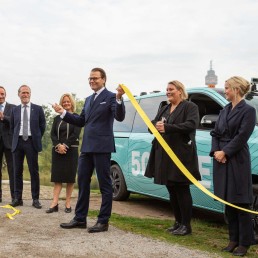
“HRH Prince Daniel at the launch of Future 5G Ride, 24 September 2020. Autonomous transport has come a long way since.”
“Future 5G Ride has shown what it really takes to make autonomous public transport work — not just removing the driver, but rethinking the entire system around them. By combining 5G connectivity, AI monitoring, and remote supervision with a strong collaborative model, we’ve shown how we can build systems that can truly move public transport forward.” — Lucas Uhlén, Project Manager at Kista Science City.
As coordinator of Future 5G Ride, Kista Science City helped bring together partners from across sectors—creating the conditions for practical testing, shared learning, and long-term collaboration. We’ll continue to support initiatives like this to strengthen Sweden’s role in mobility innovation.
Want to get involved?
Reach out to Lucas Uhlén at lucas.uhlen@kista.com
